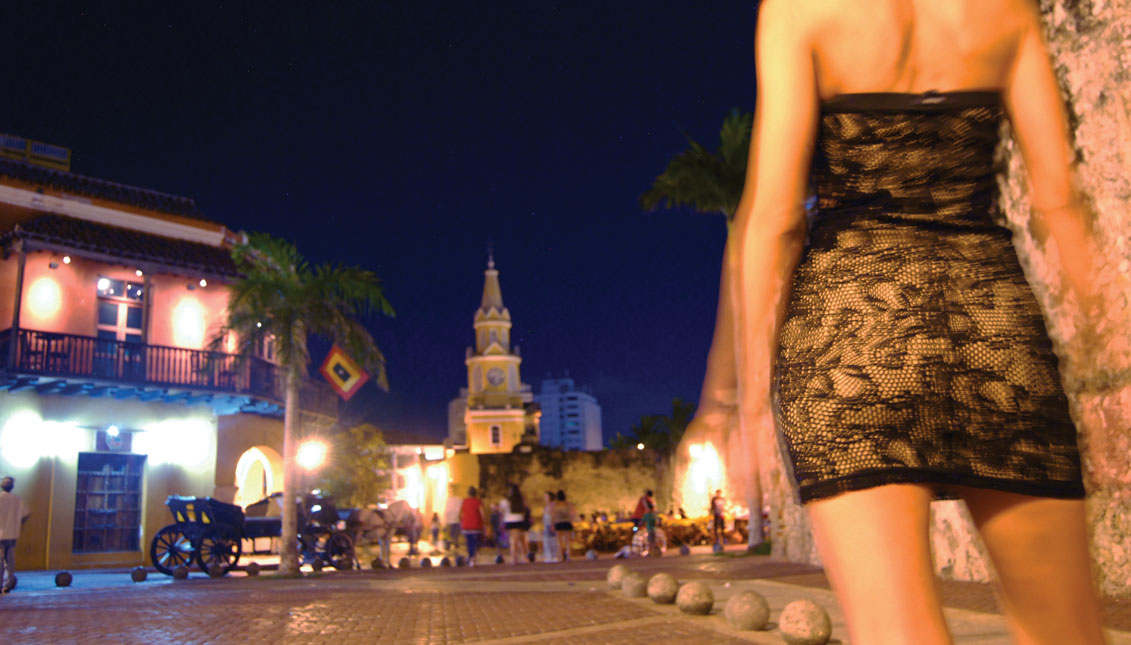
Cartagena: The dark side of tourism
The sex trade is a reality hidden behind the beauty of the famous Colombian city.
Cartagena de Indias is the most visited city in Colombia. Tourists from all over the world arrive seeking its Caribbean charm — sun, breeze, sea, the small streets under little balconies... And of course, some of them are looking for sex.
The sex trade and sex procurement are issues that make headlines and conversations again and again. Even though it is not new or exclusive to this city — the same occurs in many destinations with tourism potential — the situation in Cartagena has unique elements. First, the city’s geography and political corruption allows for every kind of illicit action, without consequence.
Not only is Cartagena one of Colombia’s jewels and a World Heritage city, welcoming more than 2 million tourists in 2018, it is also one of the most politically unstable cities and the third poorest in the country, as well as one of the most unequal. In six years, Cartagena has seen 10 mayors, most of them removed and facing criminal proceedings, a situation that has greatly undermined the city’s institutions.
In this chaos, much fails in “La Heroica” — permissions, rules and finance decisions are made by officials that don’t last in their positions long enough to be responsible for them. In 2017, for example, Cartagena was chosen to host the Latin America Adult Business Expo. While authorities tore their clothes and vowed they would do everything possible to protect the city’s image, the event took place.

On social media, there have also been parties promoted known as “Sex Island.” The idea is that, for $7,000, people can attend a VIP party on a private yacht heading for one of the city’s islands, where there will be unlimited drugs, sex, and alcohol.
The first of these parties was going to take place at the end of 2017, but apparently the event was canceled in the midst of the scandal revolving around it. Nevertheless, in recent weeks the issue has returned. The organizers are promoting the 2018 version of the event, and Cartagena is one of two possible places to host the party. Organizers will reveal the selected city at the last minute to those that confirm attendance.
When these and similar events occur, authorities make statements.
“We won’t tolerate the minimum attempt to disrespect our city, we are against abuse and the promotion of sex exploitation in any of its forms,” said Pedrito Pereira, the mayor of Cartagena. In the end, these are just empty words because authorities cannot prove whether these parties take place or not — they are held on remote islands, in private yachts and with adults (it’s assumed) that go there by choice.
And there’s more: In July, authorities captured 18 people during a raid against sex slavery in the city, which included charges of commercial sexual exploitation of girls and teenagers in historic squares, trafficking of women on Caribbean Islands, sex parties between tourists and teenagers, and the disturbing case of a former army captain who tattooed underage victims after abusing and extorting them.
This operation was so scandalous that justice has been unusually efficient. The captain has already been sentenced to 21 years in prison. The same raid led to the fall of “La Madame,” a woman accused of leading a VIP prostitution network in the city who then became a national celebrity. Many people want a picture with her in San Diego prison, located in Cartagena’s historic center — even Security Secretary of Cartagena Víctor Arango, who had to resign after taking a selfie with “La Madame.”
“The security secretary [director de distriseguridad] taking a selfie with La Madame goes against fighting corruption and the construction of a public administration that acts with ethics and can be a reference for decency,”said Colombian Vice President Marta Lucía Ramírez via Twitter.
The vice president, who has been in charge for some months, not only gave the security secretary the final blow with her tweet, but also addressed what is happening in the city.
“We have to eradicate sex tourism with those who are underage. If there are children that are in danger and vulnerable, we have to warn authorities, we have to create institutional networks in order to react quickly,” said Ramirez.
“La Madame,” whose real name is Liliana del Carmen Campos, is 47 years old. She was in prison in the U.S. and extradited to Colombia in 2005. She was married to a drug trafficker and studied modeling in New York. Her contacts in the U.S. allowed her to start a successful escorting business and to manage a catalog of women for VIP clients, catered to in five-star hotels, bachelor parties, or in yachts destined for Islas del Rosario. The problem was not that she offered her own body, but that she offered women from her “catalog” and earned a high rate for it, according to the authorities.
RELATED CONTENT
“I was working with public figures, from the United States and Mexico. I organized the bachelor party for Lindsay Lohan’s brother. I was bringing Mets players and I wasn’t going to burn the midnight oil, staying up all night to go to the airport, paying for a 160-dollar dress, and 70-dollar heels, so that four days later they show their true colors and ask for 70 dollars. I went for what was mine. The minimum tip was 1,600 dollars, because I [did] everything. I was in charge of the water, the ice, alcohol, managed everything, transportation, yachts, everything was in the boat. I had no competition. What put me here [in prison] is people’s envy,” Campos told El Universal, the local newspaper, the same day the polemic selfie was taken.
But the story isn’t limited to the local or national sphere. There are strong links between Israel and certain places such as Casa Golam and Casa Benjamin, located in El Laguito, one of the most popular tourist areas in Cartagena. In these sites, there have been parties that have lasted several days and ended with sex scandals with teenagers.
Assi Moosh and Jakob Amsalem managed a tourism business that served as a façade for a prostitution and drug network catered to Israelis. These parties are an open secret not only in Cartagena but also in other cities of Caribbean Colombia like Santa Marta, where Moosh arrived in 2009. The former soldier, who was expelled from Colombia at the end of 2017, presented himself as a successful hotelier, but behind this disguise he managed a business of sex exploitation that turned the Colombian Caribbean into the preferred destination for retired Israeli soldiers.
“They came to Colombia in their sabbatical years, with the resources paid to them by the state of Israel after their military service, that they spent on abominable sexual activities, to the point that they rented country houses and held illegal parties” explained the general attorney, Nestor Humberto Martinez, to national media. “There were raids that people never knew about, where hordes of foreigners from Israel that arrived in the country were found being offered all kind of punishable bacchanals and parties that were targets of intervention at the time.”
Beyond the luxurious parties, sex work and exploitation are easy to find with a quick walk by the historic center. Every night, in front of the Torre del Reloj, the main entrance to the old city, Colombian women offer their bodies to foreign people, and it is believed that some of these women are underage. The problem is so huge that the possibility of creating a red-light district has been discussed.
Those who work by themselves are not committing a crime, since prostitution is considered a job in Colombia. What is illegal is procurement, and even worse, sex trade with underage boys or girls, issues that are also seen in the streets of Cartagena.
Sex workers earn between $30 and 50 “for a moment.” They offer their services to men that pass by the doors of the walled city from nightfall until well into the early morning hours. Now they are joined by Venezuelan women that arrived in Cartagena due to the crisis in their country. They offer their bodies for half the price of Colombians. Competition is hard and food for their families is at stake.
Slightly more than a million people live in Cartagena, of whom 262,000 are poor, and around 40,000 live in extreme poverty. This dire need is invisible to the tourists that wander through the walled city, who can pay $70 dollars for a meal in one of the exclusive restaurants in the city, a sum equivalent to what a Colombian working for minimum wage makes in a week. This level of inequality has turned the city into a fertile ground for sex trade, but measures to address it appear to be few, and fail to go beyond slogans or institutional positions.
While authorities act desperately to clean up the image of a city caught up in the sex trade, and the tourism secretary forbids speaking of sex tourism, Cartagena continues to move to a different rhythm, at a much darker and more furious pace.











LEAVE A COMMENT: